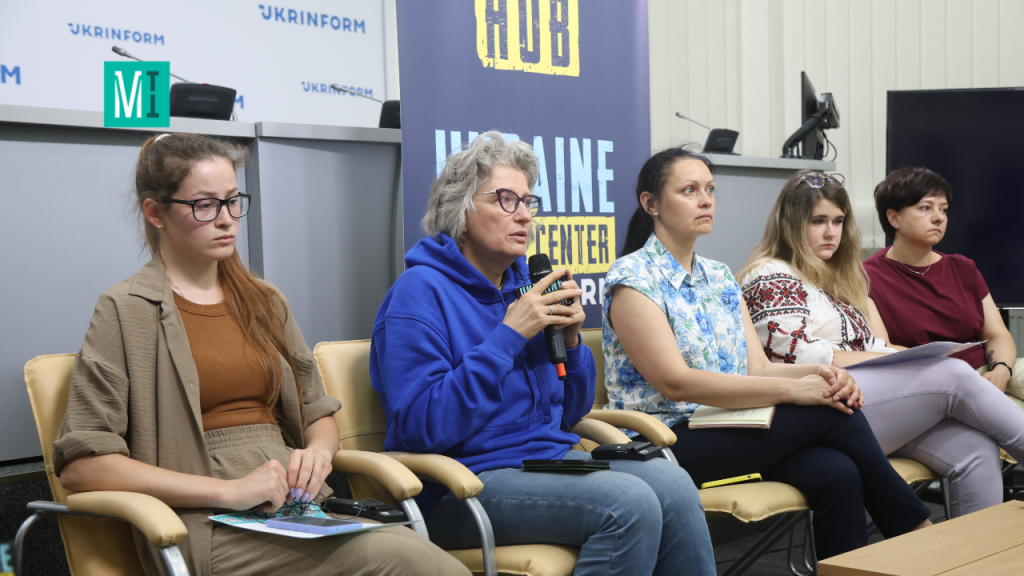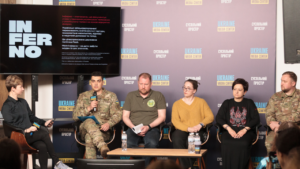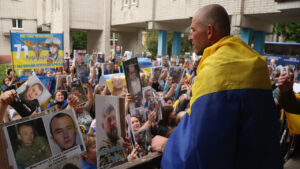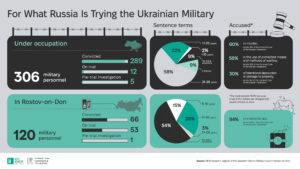Relatives of Captive Soldiers from the 36th Brigade Call for Doing Everything Possible to Return Members of their Families: Cases of Death in Captivity have Become a Consistent Trend

The number of deaths in Russian captivity has increased dramatically due to inhumane conditions of detention, tortures, beatings, lack of proper nutrition and medical care. This is particularly true for the defenders of Mariupol, including marines of the 36th brigade.
These statements were made during a press conference by experts of the Media Initiative for Human Rights and relatives of captured members of the 36th Separate Marine Brigade Named after Rear Admiral Mykhailo Bilynskyi.
“Inhumane conditions of detention result in the increased number of deaths in captivity. If these cases were isolated at the beginning of the invasion, now they are documented during every exchange of bodies.
Russia does everything possible to ensure that the cause of death of captives is not discovered. This is because they die as a result of tortures, illnesses caused by improper conditions of detention or complete exhaustion,” says Tetiana Katrychenko, the MIHR Coordinator.

Tetiana Katrychenko, the MIHR Coordinator Photo by Viktor Kovalchuk
According to her, due to the lack of any supervision and its complete disregard for the basic principles of international law, Russia has introduced the “right to violence” in places where Ukrainian prisoners of war are held, which is particularly cruelly enforced in relation to the defenders of Mariupol.
Olena Bieliachkova, the Coordinator of the Media Initiative for Human Rights responsible for communication with families of prisoners of war, confirms information about numerous cases of death in captivity.
“We receive information from families of those who is held in captivity and former prisoners of war. As a result of communication with them, the MIHR has already confirmed 22 deaths in captivity. But relatives report 160 deaths. According to the information we have, the last exchange of bodies alone makes it possible to conclude that four persons died in captivity. And in April it was reported that 11 people had died in captivity,” she said.

Olena Bieliachkova, the Coordinator of the Media Initiative for Human Rights responsible for communication with families of prisoners of war. Photo by Viktor Kovalchuk
Olena Bieliachkova stresses that captured soldiers of the 36th brigade are subjected to extremely cruel treatment in Russia.
“In total, about 1,300 servicepersons of the 36th brigade are held in captivity. When bodies are returned, there are those who were tortured to death. And marines account for a significant share.
Soldiers of the 36th brigade and, in particular, the 501st battalion are very rarely exchanged. Moreover, so-called trials, held in Russia against defenders of Mariupol, complicate the exchange efforts, since prisoners are transferred to relevant institutions to serve an illegal sentence after verdicts are announced. It is very difficult to get them out of there.”

Relatives of captive soldiers of the 36th Separate Marine Brigade Named after Rear Admiral Mykhailo Bilynskyi and MIHR experts at a press conference. Photo by Viktor Kovalchuk
Bieliachkova says that even if the fact of captivity is confirmed by the International Committee of the Red Cross, it is not a guarantee that a captive soldier will remain alive. Milana Kompaniiets, the mother of Yurii Hulchuk, captured member of the 36th Separate Marine Brigade, is of the same opinion. She says that, in a meeting with members of one of the Verkhovna Rada committees, they were told that 176 bodies of captives had been returned since the beginning of the full-scale invasion of Ukraine. Captivity of about 80 of them was confirmed by the ICRC.
Milana Kompaniiets said that she had managed to learn about the conditions in which her son was held.
“I found out the things that I, as a mother, probably shouldn’t have known about. I am also a medical professional, so I understand very well what all these symptoms, described by the guys who managed to return, mean. About three spoons of porridge, half a cup of tea and two thin slices of bread – that’s all the food. There is also no opportunity to drink – one cup of water for eight persons. Such exhaustion very quickly leads to fatal consequences. They are forced to stand for 18 hours a day.”
“My son was tortured with an electric shocker until his legs were paralyzed. He lost the ability to speak after being beaten once again. It could be a microstroke or other injury to the nervous system,” says Milana Kompaniiets.

Milana Kompaniiets, the mother of Yurii Hulchuk, the captive soldier from the 36th marine brigade. Photo by Viktor Kovalchuk
Hanna Bei, the wife of prisoner of war Pavlo Bei, a senior sailor of the 501st separate battalion of the 36th separate marine brigade, says that her husband lost about 35 kg in captivity.
“I believe that this is a critical stage of dystrophy. I would like you to pay attention to the fact that the marines are taken to the colony in Mordovia. There are the worst conditions of detention there, and it is from there that the bodies of tortured captives are often returned,” Hanna Bei says.

Hanna Bei, the wife of prisoner of war Pavlo Bei, a senior sailor of the 501st separate battalion of the 36th Separate Marine Brigade. Photo by Viktor Kovalchuk
At the same time, Yuliia Petryk, the wife of Mykyta Petryk, the captured major of the 36th Separate Marine Brigade, demands that Ukrainian officials should take into account the length of time spent in captivity when submitting exchange lists.
“Our relatives have been kept in captivity for more than two years. And priority should be given to those who have been held there the longest. As well as to the units that have the lowest percentage of returned captives,” she says.
Yuliia Petryk adds: “If it is possible to transfer captive soldiers of the 36th brigade to another country before the end of the war, as is the case with the commanders who were transferred to Turkey, then we, their relatives, agree to this. After all, there they will be provided with sufficient food, medical care and normal living conditions.”

Yuliia Petryk, the wife of Mykyta Petryk, a prisoner of war, Major of the 36th Marine Brigade. Photo by Viktor Kovalchuk
Relatives of prisoners of war called on the world and Ukrainian authorities to do everything possible to release the soldiers of the 36th marine brigade from captivity.







